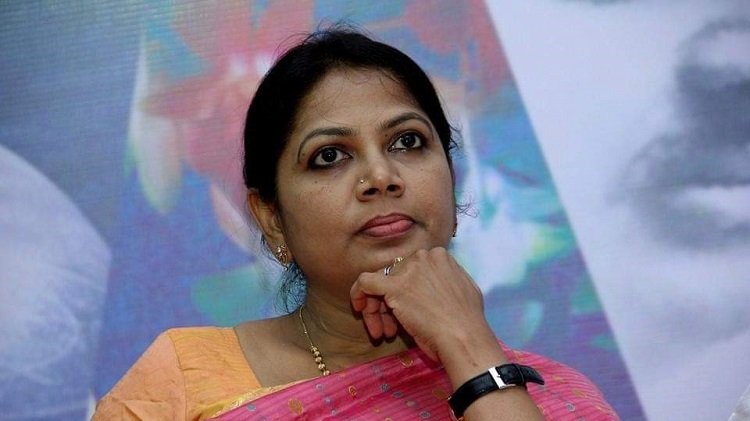Read in : தமிழ்
Writer, activist and politician, Salma is a thoughtful chronicler of the position of women in society, man-woman relationships, as well as the Muslim community and its mores. In an interview to inmathi.com, Salma talks about the hijab controversy.
In its ruling on the Karnataka government order banning the wearing of hijab in case of college norms, the high court had decided on a religious question: whether wearing the hijab was an essential part of Islam. Critics have said the judgment takes a highly legalistic view of the question without going into personal freedom, rights, sentiments, traditional practices and the communal situation in the country.
Inmathi: Is hijab an essential part of Islam, in your view?
Salma: Only Muslims can decide if hijab is an essential part of Islam. Wearing the hijab is a part of the belief of Muslims. In an India that has not been pro this or that caste or religion, people have been living as per their wishes all these years. A religious belief that had been held all these years has been questioned by the high court. Has wearing hijab done harm to anyone? Wearing the bindi on the forehead, the sacred thread, the religious thread around the wrist, or a turban in the case of Sikhs has been a practice for a long time. What has become a matter of debate is the idea that a particular community should not wear a certain dress.
Inmathi: During the hearing of the hijab case, the government side raised the question of whether hijab was essential to Islam. Was the opposite side unable to prove that it was?
Salma: Islam emphasizes dignity in the choice of clothes to wear. In our country, we believe that sarees are dignified attire. In neighbouring Pakistan, sarees are considered vulgar. They wear churidhar instead. They see that churidhars uphold dignity. In our country, people choose to wear clothes depending on where they live, culture, climate and environment. Dress is an individual right. In that, no other individual, society or government can bring restrictions or regulations. We cannot keep proving religious belief. Doing politics with dress should be avoided.
Inmathi: Why is dress politics happening?
Salma: In states ruled by the BJP, this is being done to bring Hindus together and orient them against a particular community. It is a move to orchestrate issues, create problems and bring votebanks under their domain. For instance, the movie, Kashmir Files has wrongly portrayed the Muslim community. The Indian government is not only celebrating the movie but government officials have been emphasizing that everyone should watch the film. The government is orchestrating hatred towards a community in a planned manner. These are not isolated events. They are happening one after the other where BJP is ruling. This only shows that they have started the work on creating votebanks for the next election.
Inmathi: Are Muslim women being forced to wear hijab? Is the freedom of Muslim women to choose what they wear being taken away from them?
Salma: From the very beginning, wearing the hijab has been part of Islamic religious belief. I don’t like to wear sarees but sometimes the situation demands the wearing of a saree so I wear it. Hijab is also like that. Muslim women wear hijab because they like to do so. They cannot be forced to wear what they don’t like. I don’t wear hijab and that’s my choice. I cannot be compelled to wear it. No one can compel anyone else to wear a particular dress or not wear something else.
In our country, people choose to wear clothes depending on where they live, culture, climate and environment. Dress is an individual right. In that, no other individual, society or government can bring restrictions or regulations. We cannot keep proving religious belief. Doing politics with dress should be avoided.
Since Islam says that women should wear clothes that are dignified, Muslim women choose hijab as per their wish. It’s unacceptable that a community should be asked to suddenly give up on a religious belief they have followed for ages. Neither can the opposition to hijab be accepted. Since hijab is worn as per the individual’s religious belief and choices, it doesn’t take away a woman’s freedom to wear clothes of her choice.
Inmathi: Wearing the hijab or burqua had been considered a tool to subjugate women. What is your view on this?
Salma: Wearing hijab or burqua has been followed based on religious belief. A matter of choice cannot be considered a tool to control women. If there is any compulsion that a woman should only wear certain clothes, then that is wrong. In our country where traditional culture and religious fundamentals are a part, a certain image has been created that a Hindu woman must have the bindi on her forehead or a Muslim woman should wear the hijab. Women have also become used to accepting this. If this doesn’t appear wrong for the women concerned, why should others call it subjugation.
Children are made to wear hijab. Children should be treated as children. It’s unacceptable that they should be made to wear hijab. At the same time, what women wear with full awareness should not be opposed either.
Inmathi: In schools and colleges, there are dress codes and uniforms. Jeans, sleeveless and dhotis are not allowed, for instance. Why should an exception be made for hijab?
Salma: Even if uniforms are prescribed [in schools and colleges], a practice that has been followed for ages cannot be suddenly changed. The discipline of uniforms is being seen as applying to only clothes. Why is not being seen as applicable to the bindi on the forehead, yellow or black threads around the wrist, [Sikh] turbans or hair styles?
If the uniform discipline is to be observed, all students should look uniform [similar]. Why should uniformity apply only to clothes but diversity is allowed in other things?
Read in : தமிழ்











